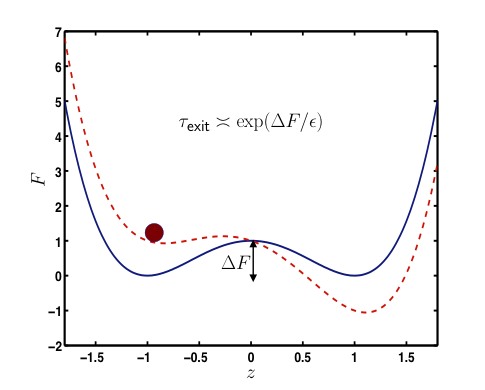Rare events and statistical mechanics of driven systems
Description
Many molecular systems display a huge range of time scales. Typically the systems are subject to small noise (e.g., from the environment) that induces events which are rare with respect to the time scale of the system’s internal vibrations. In thermal equilibrium, the time scales between the slowest processes and the fastest vibrations easily span 15 orders of magnitude where the latter limits the admissible time step in any numerical simulation. Building up statistics on the rare events by direct numerical simulation is therefore unfeasible.

By suitable driving the rare events can be forced, however, at the price of biasing the system’s thermodynamic equilibrium. The goal of the project is to better understand the large deviations statistics of diffusive systems under driving and to design steering protocols that are optimal in the sense that they minimally perturb the dynamics and give rise to robust numerical estimators for equilibrium expectations.
Funding
The project is funded through the DFG-SFB 1114 "Scaling Cascades in Complex Systems".
Selected publications
- W. Zhang, H. Wang, C. Hartmann, M. Weber and Ch. Schütte (2014), Applications of the cross-entropy method to importance sampling and optimal control of diffusions, SIAM J. Sci. Comput. 36, A2654-A2672
- C. Hartmann, R. Banisch, M. Sarich, T. Badowski and Ch. Schütte (2013), Characterization of rare events in molecular dynamics, Entropy 16, 350-376
- C. Hartmann and Ch. Schütte (2012), Efficient rare event simulation by optimal nonequilibrium forcing, J. Stat. Mech. Theor. Exp., P11004
